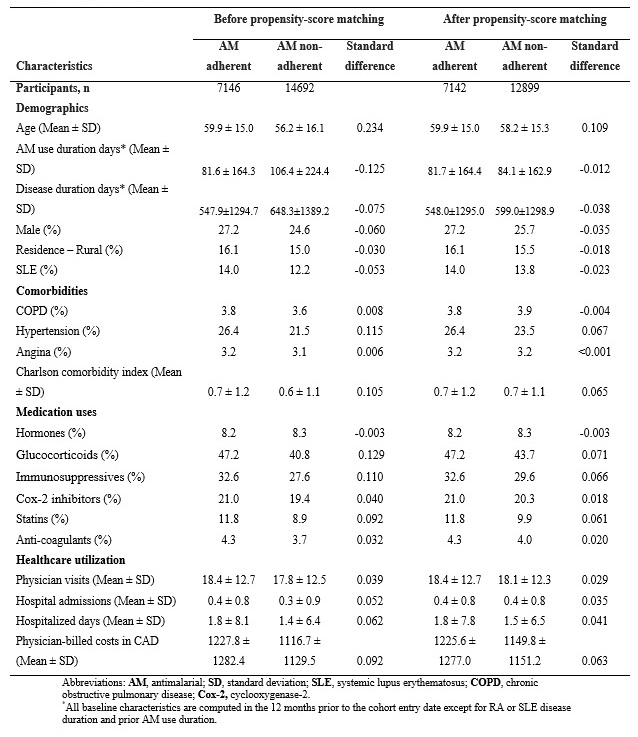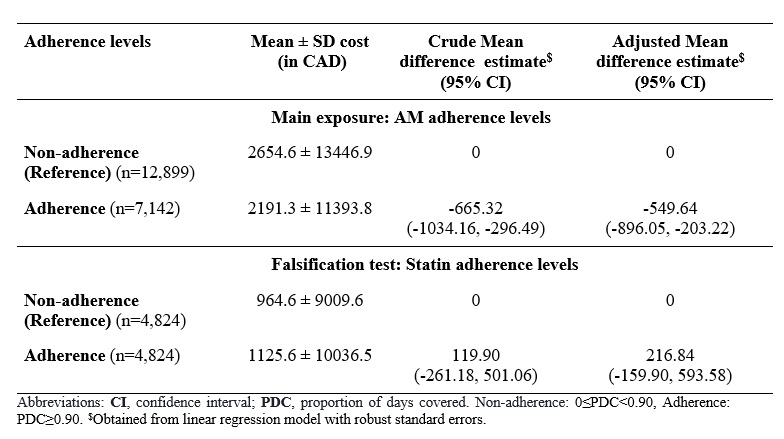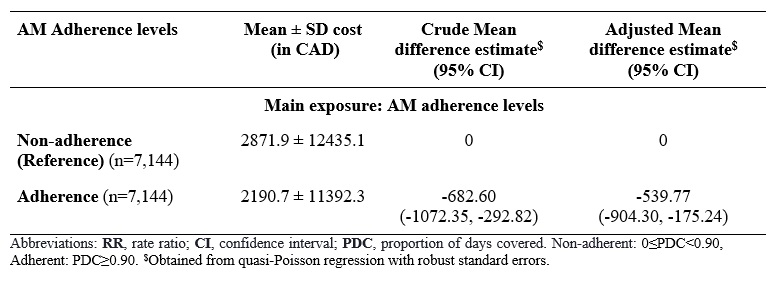Session Information
Session Type: Abstract Session
Session Time: 3:00PM-4:30PM
Background/Purpose: To examine the association between antimalarial (AM) adherence and hospitalization costs among newly diagnosed rheumatoid arthritis (RA) and systemic lupus erythematosus (SLE) patients.
Methods: We used administrative databases for British Columbia, Canada, to conduct a population-based propensity score (PS)-matched study of incident cohorts of RA and SLE with incident AM use between January 2000 and March 2022. Index date was defined as the first time when subjects met RA/SLE criteria and had AM. Only subjects with at least one year of follow-up after index date were included. In the first year (“baseline year”), we calculated AM adherence using proportion of days covered (PDC) and categorized as adherence (PDC≥0.90) or non-adherence (0≤PDC< 0.90). We computed the PS for AM adherence using baseline variables on demographics, RA or SLE disease duration, and prior AM use duration evaluated at index date, comorbidities, other medications, and healthcare utilization evaluated over 12 months prior to index date; Each AM adherent patient was matched with up to two AM non-adherent patients. Our outcome, hospitalization costs in the following year (“follow-up year”), was calculated according to the Canadian Institute for Health Information guidelines and adjusted for inflation. We used linear regression model with robust standard error to examine the impact of AM adherence during the baseline year on hospitalization costs in the follow-up year, adjusting for above baseline variables in the matched sample. Using the same design, we examined the association between hospitalization costs and the adherence of an unrelated drug, statin, as a falsification test to rule out the possibility of confounding by unmeasured healthy adherer effect: one expects to find no association if the study design adequately controls for potential healthy adherer bias since statin adherence is not expected to have immediate effect on hospitalization costs.
Results: We identified 7,146 AM adherent and 14,692 AM non-adherent incident RA and SLE patients. After PS matching, 7,142 AM adherent (mean age 59.9 years, 72.8% female) and 12,899 matched AM non-adherent (mean age 58.2 years, 74.3% were women) were included in the analysis (total = 20,041). After matching, all baseline variables between AM adherent and non-adherent patients were well balanced, with all standardized differences less than 0.11 (Table 1). The mean hospitalization costs were 2191.3 CAD and 2654.6 CAD for AM adherent and non-adherent patients in the follow-up year, respectively. Using the linear regression model, on average hospitalization costs were lower (Est: -549.26 CAD, 95% CI: -896.1, -203.2, p-value: < 0.01) for AM adherent patients than AM non-adherent patients after adjusting for baseline variables (Table 2). Similar results were obtained for one-to-one PS-matched sample (Table 3). The falsification test showed that our matched study design is unlikely to be subject to unmeasured healthy adherer effect (Table 2) since a protective association was not found for statin adherence.
Conclusion: Adherence to AM therapy in RA and SLE patients was associated with a lower hospitalization costs ($549.6 CAD lower) when compared to patients with non-adherence.
To cite this abstract in AMA style:
Hoque M, Lacaille D, Avina-Zubieta J, De Vera M, Qian Y, Esdaile J, Xie H. Early Antimalarial Adherence Reduces Future Hospitalization Cost in Rheumatoid Arthritis and Systemic Lupus Erythematosus Patients: Evidence from a Population-based Study [abstract]. Arthritis Rheumatol. 2024; 76 (suppl 9). https://acrabstracts.org/abstract/early-antimalarial-adherence-reduces-future-hospitalization-cost-in-rheumatoid-arthritis-and-systemic-lupus-erythematosus-patients-evidence-from-a-population-based-study/. Accessed .« Back to ACR Convergence 2024
ACR Meeting Abstracts - https://acrabstracts.org/abstract/early-antimalarial-adherence-reduces-future-hospitalization-cost-in-rheumatoid-arthritis-and-systemic-lupus-erythematosus-patients-evidence-from-a-population-based-study/



